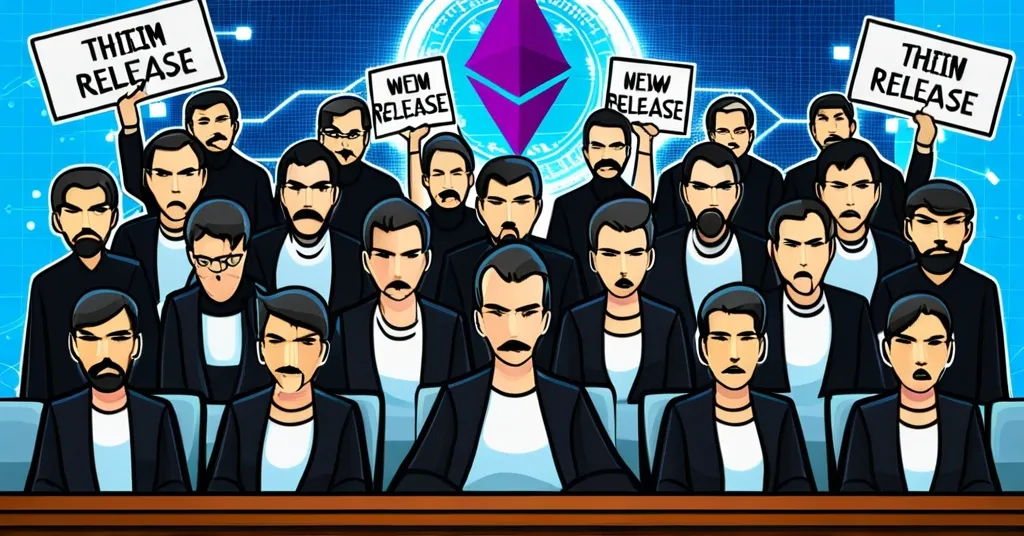Ethereum Community Demands Release of Developers Amid Legal Battles

Ethereum Community Rallies for Developers Amid Legal Challenges
Inspired by former President Trump’s pardon of Silk Road founder Ross Ulbricht, the Ethereum community is now fervently calling for the release of its own developers: Virgil Griffith, Roman Storm, and Alexey Pertsev. This movement underscores a broader fight for privacy and the rights of software developers in the face of legal scrutiny.
- Ethereum community seeks clemency for Griffith, Storm, and Pertsev
- Legal battles over privacy tools like Tornado Cash
- Court orders Tornado Cash removal from U.S. sanctions list
Virgil Griffith, an Ethereum developer, is currently serving a 56-month sentence for what’s known as sanctions violations. In simpler terms, he broke rules that prevent dealings with certain countries or individuals, following his trip to North Korea. Meanwhile, Roman Storm and Alexey Pertsev, the minds behind the privacy tool Tornado Cash, are in the legal hot seat for money laundering and similar sanctions breaches. Tornado Cash, for those unfamiliar, is a type of cryptocurrency mixer – a service that mixes potentially identifiable or ‘tainted’ cryptocurrency funds with others to anonymize the trail. It’s like tossing your coins into a giant digital blender, where they come out looking like everyone else’s.
Vitalik Buterin, the co-founder of Ethereum, isn’t sitting on the sidelines. He’s been a vocal advocate for these developers, proclaiming,
“No man left behind.”
He further emphasized,
“You created Tornado in significant part because of my suggestion that it is something worth building. It would violate basic honor for me to do that, and then fail to support you in your hour of need. In Ethereum we protect our own, and uphold our honor.”
Buterin’s stance highlights the Ethereum community’s solidarity and commitment to its members, rallying harder than a Bitcoin miner in a heatwave.
Roman Storm has described his ordeal as a “terrifying criminalization of privacy,” emphasizing the broader implications of such legal actions. He argues that the charges against him infringe on his First Amendment rights, a claim he’s sought to have dismissed in court. It’s a bold move, challenging the notion that writing code can be criminalized when it’s deployed for privacy.
In a significant twist, a court recently ordered the removal of Tornado Cash from a U.S. Treasury sanctions list. This decision acknowledges the autonomous nature of smart contracts – self-executing programs with terms directly written into code – and suggests a potential shift in how these technologies are regulated. It’s a rare victory for the privacy-focused sector of the crypto industry, hinting that the traditional legal system might be struggling to keep up with the blockchain revolution.
Entrepreneur Vivek Ramaswamy isn’t mincing words either, calling out the absurdity of targeting developers while actual criminals roam free. He stated,
“Authorities should focus on pursuing the actual criminals breaking the law rather than targeting developers.”
His perspective resonates with a community that feels the heat of legal scrutiny over the tools they create, rather than the criminals who misuse them.
The Ethereum community’s response to these legal challenges is a stark reminder of the ongoing tension between blockchain technology and regulatory frameworks. The community champions privacy and innovation, while regulatory bodies grapple with fitting these new technologies into existing laws. The recent pardon of Ross Ulbricht has only intensified these discussions, drawing parallels between different sectors of the crypto world.
As we navigate these complex waters, it’s clear that the battle for privacy and the rights of developers is far from over. The Ethereum community’s solidarity and the legal shifts around Tornado Cash indicate a pivotal moment in the evolution of cryptocurrency and blockchain technology. This isn’t just about freeing a few developers; it’s about setting a precedent for how the world views and regulates the tools of the future.
Key Takeaways and Questions
- What prompted the Ethereum community to call for the release of Virgil Griffith, Roman Storm, and Alexey Pertsev?
The community’s call was prompted by former President Trump’s pardon of Silk Road founder Ross Ulbricht, which led to similar demands for clemency for these Ethereum developers. - What charges are Virgil Griffith, Roman Storm, and Alexey Pertsev facing?
Virgil Griffith is serving time for sanctions violations. Roman Storm and Alexey Pertsev are facing charges related to money laundering and sanctions breaches linked to their work with Tornado Cash. - How has the Ethereum community responded to the legal troubles of these developers?
The Ethereum community, led by figures like Vitalik Buterin, has rallied in support of the developers, calling for their release and highlighting the importance of protecting privacy and the rights of software developers. - What significant legal development occurred regarding Tornado Cash?
A court ordered the removal of Tornado Cash from a U.S. Treasury sanctions list, recognizing that smart contracts operate independently and suggesting a need for updated laws regarding cryptocurrency mixers. - What criticism did Vivek Ramaswamy make about the legal actions against developers?
He criticized the focus on developers rather than on actual criminals breaking the law, suggesting that authorities should prioritize the latter.



